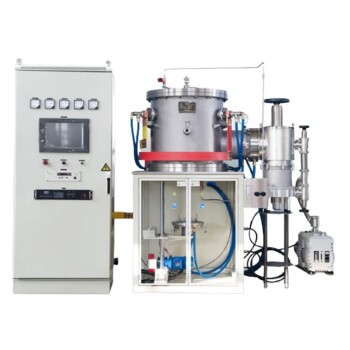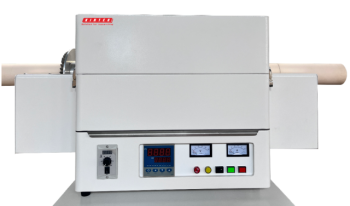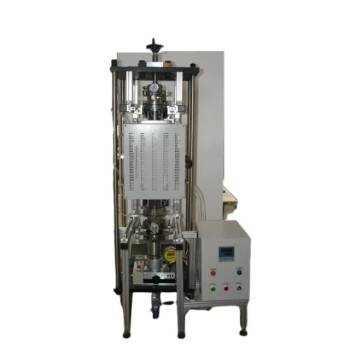The most common piece of equipment used to heat a joint for brazing is a torch, but this is far from the only option. The choice of heating equipment is critical and depends entirely on the materials being joined, the complexity of the assembly, and the required production volume. Methods range from manual torches for single repairs to highly automated systems like furnaces and induction coils for mass production.
The central challenge in brazing is not merely heating the joint, but heating it uniformly and with precise control. Therefore, the "right" equipment is the one that best matches the heat source's characteristics—its speed, precision, and cost—to the specific demands of your application.
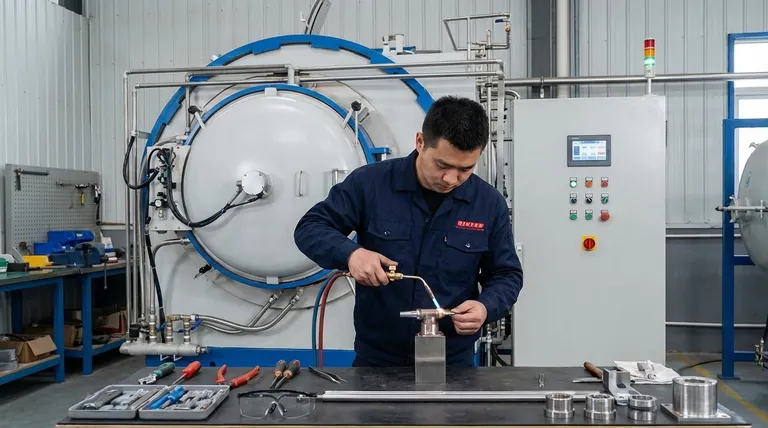
A Guide to Common Brazing Heat Sources
Understanding the primary methods for applying heat is the first step in mastering the brazing process. Each technique offers a different balance of speed, control, and cost, making it suitable for different scenarios.
Manual Torch Brazing
This is the most widespread and versatile method. An operator uses a hand-held torch, which mixes a fuel gas (like acetylene, propane, or MAPP gas) with oxygen or air to produce a flame.
The key to successful torch brazing lies in operator skill. The technician must manipulate the flame to heat the base metals evenly to the correct temperature, allowing the filler metal to be drawn into the joint by capillary action.
Furnace Brazing
For high-volume production and complex assemblies, furnace brazing is a superior method. Parts are pre-assembled with the filler metal placed at the joint, often in the form of a paste, wire, or shim.
The entire assembly is then placed into a furnace and heated in a controlled atmosphere (such as a vacuum or an inert gas like nitrogen). This prevents oxidation, often eliminating the need for flux and resulting in exceptionally clean, strong joints.
Induction Brazing
Induction brazing uses high-frequency electromagnetic fields to generate heat directly within the metal parts. An induction coil is placed around the joint area, and an alternating current creates eddy currents in the workpiece, causing rapid and localized heating.
This method is extremely fast, precise, and highly repeatable, making it ideal for automated manufacturing lines where the same joint must be brazed thousands of times.
Resistance Brazing
In this process, a high electrical current is passed through the components being joined. The joint area itself provides the highest electrical resistance, causing it to heat up rapidly and melt the pre-placed filler metal.
Resistance brazing is useful for joining small, electrically conductive parts where heat must be applied very quickly and locally, such as in the manufacturing of electrical contacts or connectors.
Understanding the Trade-offs
Choosing a heating method involves balancing cost, quality, and speed. There is no single best solution, only the most appropriate one for the task at hand.
Initial Cost vs. Operational Cost
Manual torch brazing has a very low initial investment cost but can have a high labor cost per part due to its manual nature.
Conversely, furnace and induction systems require a significant upfront capital investment but deliver a much lower cost per part in high-volume production due to automation and speed.
Precision vs. Flexibility
Automated methods like induction and furnace brazing offer unmatched precision and repeatability, ensuring every joint is identical. However, they are designed for a specific part and are not easily adapted to different jobs.
A manual torch offers maximum flexibility. A skilled operator can adapt to a wide variety of joint configurations and part sizes on the fly, making it perfect for repairs, prototyping, and low-volume work.
The Universal Goal: Uniform Heating
Regardless of the method, the fundamental goal remains the same: heat the base metals evenly so they reach the brazing temperature at the same time. If one part is hotter than the other, the filler metal will flow only toward the hotter side, resulting in a weak or incomplete joint.
Matching the Method to Your Goal
Your specific objective dictates the best heating equipment for the job.
- If your primary focus is one-off repairs or prototyping: A manual torch offers the best flexibility and the lowest initial cost.
- If your primary focus is high-volume, repeatable production of a single part: Induction brazing (for speed) or furnace brazing (for quality and complexity) is the correct choice.
- If your primary focus is joining heat-sensitive or dissimilar metals: A precise, localized method like induction or laser brazing provides the necessary control to avoid damaging the components.
- If your primary focus is creating perfectly clean joints with no oxidation: Vacuum or controlled-atmosphere furnace brazing is the definitive solution.
Ultimately, understanding the different ways to apply heat empowers you to select the process that will deliver the strongest, most reliable joint for your specific needs.
Summary Table:
| Heating Method | Best For | Key Advantage |
|---|---|---|
| Manual Torch | Repairs, Prototyping | Flexibility & Low Initial Cost |
| Furnace | High-Volume, Complex Parts | Controlled Atmosphere & Clean Joints |
| Induction | Automated, Repeatable Production | Speed & Precision |
| Resistance | Small, Conductive Parts | Localized, Rapid Heating |
Ready to achieve perfect brazing results? The right equipment is key to uniform heating and strong joints. At KINTEK, we specialize in lab equipment and consumables for all your brazing needs, from flexible torches to high-precision automated systems. Our experts can help you select the ideal solution for your materials and production volume. Contact us today to discuss your project and get a personalized recommendation! Reach out via our Contact Form
Visual Guide
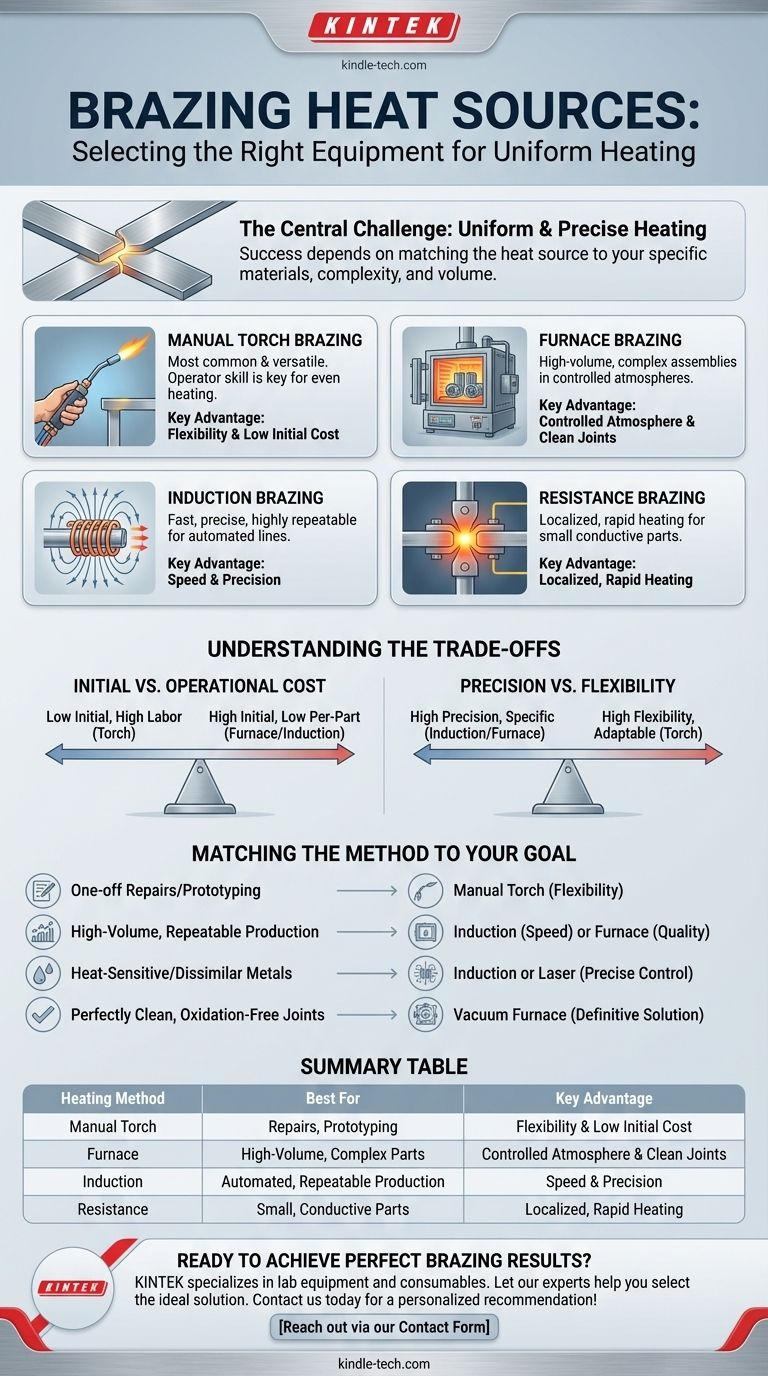
Related Products
- Vacuum Heat Treat Sintering Brazing Furnace
- Molybdenum Vacuum Heat Treat Furnace
- 2200 ℃ Graphite Vacuum Heat Treat Furnace
- 2200 ℃ Tungsten Vacuum Heat Treat and Sintering Furnace
- Vacuum Heat Treat Furnace with Ceramic Fiber Liner
People Also Ask
- What is a vacuum furnace used for? Unlock Purity in High-Temperature Processing
- What are vacuum furnaces used for? Unlock Ultimate Material Purity and Performance
- What is brazing in heat treatment? Achieve Superior Joint Quality and Efficiency
- What is the cost of a vacuum brazing furnace? A guide to key factors and investment strategy
- What is vacuum brazing? The Ultimate Guide to High-Purity, Flux-Free Metal Joining



